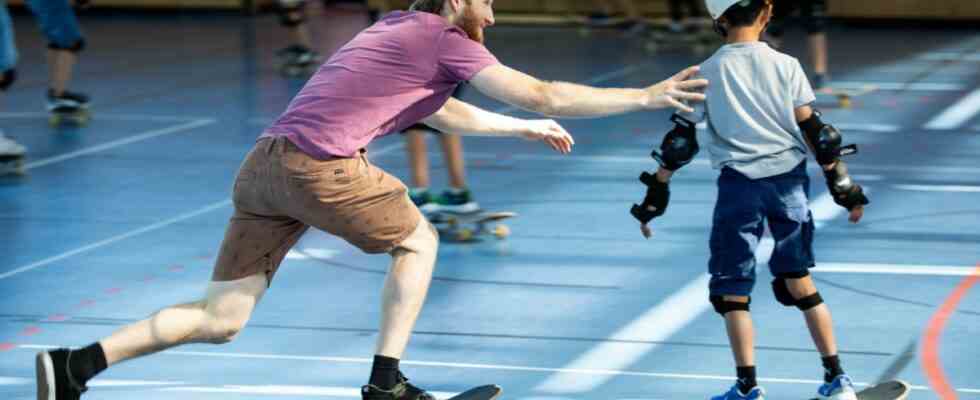Adrien Hannart casually rolls on his skateboard and makes clear statements: “Push two or three times to the blue line, then keep your balance on one foot.” The twelve fourth graders he addresses stare wide-eyed as he demonstrates the exercise. “How do you do that?” asks a surprised girl. “I don’t think I can do it,” says the boy next to her. At Hannart’s command, they try to imitate the exercise anyway. And almost nobody manages to keep their balance after pushing. Some kids use their second foot to help, a few fall off the board with a bang in the gym.
Despite a helmet, knee and elbow pads, it was a painful experience. But also an important one, says Hannart. In this way, the budding skateboarders learn frustration tolerance and perseverance. And in fact, none of his students start crying. Once they fall, they quickly get back on the board. “Skateboarding is the means,” explains Hannart. The aim is to support the children in their character development.
Skateboarding teaches frustration tolerance and perseverance.
(Photo: Yves Krier)
The skateboard lessons are a cooperation project between the High Five association and the elementary school at Ravensburger Ring. Adrien Hannart is program coordinator and head coach at High Five. Every two weeks, the head coach comes to the school to teach skateboarding as part of the full-time classes in the fourth graders. His view that he supports more than just the children’s physical fitness is scientifically supported.
“It is well known that sport is important for the development of cognitive functions in children,” says Tanja Postler, a sports scientist at the Chair of Preventive Paediatrics at the Technical University (TU) Munich. In spring she published a study with several colleagues. This proves that there is a connection between children’s physical fitness and their level of concentration.
“The brain is supplied with more oxygen through physical exercise,” says Postler. “Better cell connections are formed and new cells are also formed in the long term.” This in turn not only has a positive effect on the short-term level of concentration, but also on other cognitive functions such as perception, thinking or memory: “Everything cognitive can be increased if you move a lot.”
In general, physical activity in children plays an important role in their overall personality development. In addition to physiological and cognitive factors, according to Postler, this also promotes emotional and, above all, social skills. “When children are active in a sports club or just play football together on the soccer field, then they communicate with each other and have to solve conflicts. That all has a positive influence.”
60 minutes of physical activity a day is often not achieved
It is therefore very important to sensitize the children to the topic of physical fitness at an early age. “At school, children have to know from an early age how important exercise is for them. And they have to be reminded of it again and again,” says Postler.
According to the World Health Organization, 60 minutes of physical activity a day is the minimum for healthy development in children and adolescents. This goal is often not achieved, especially during and as a result of the corona pandemic. According to Katharina Köble, who worked together with Postler on the study, there is a simple reason why this problem has not been made a big issue either by politics or by the public. “When it comes to exercise, it’s about prevention. That’s why it’s difficult to get politicians or people thinking about it, because it’s usually not acute. That’s why there’s often no urgent need for action.” It is extremely important to start an active lifestyle as early as possible. “It is well known that inactive children also become inactive adults.”
At the elementary school on Ravensburger Ring, the school management and teaching staff understood this warning. Sports promotion is part of the overall school concept there. The Ministry of Education has awarded the facility at the Ravensburger Ring a sports profile primary school. Among other things, this gives them the financial and human resources to offer one more sports lesson per week in the first grades. Pupils also have the opportunity to attend the physical education classes offered by the Department for Education and Sport.
Teachers also try to incorporate movement elements in mathematics or German
This is very important for Rector Bettina Aufhauser, above all because of the composition of her student body. “There is a very high proportion of immigrants in the area and there are many poorer families who do not have the financial means to send their children to a sports club.” She wants to make up for these deficits at her school. For this reason, campaigns have been started time and again, such as morning sports for the whole school or projects on the subject of healthy nutrition. The teachers also try to regularly incorporate movement elements into subjects such as mathematics or German. Last but not least, Aufhauser and her colleagues are trying to compensate for the lack of physical activity during the pandemic.
“The two Corona years were not a brilliant achievement in terms of children’s fitness.” Sports teacher Volker Hübner cites cycling as an example. Significantly fewer children than before the pandemic are now still safely on the bike. For Hübner, physical education is generally neglected. “We have three hours of religion and two hours of sport a week,” he says meaningfully. With the current capacities, schools alone could not make up for the deficit in physical activity among children. Not only does the children’s fitness suffer as a result, but also their cognitive, social and emotional development.

